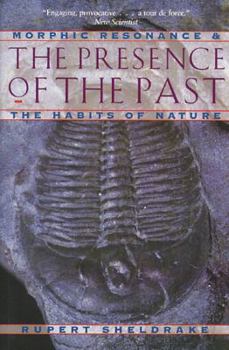The Presence of the Past: Compelling Evidence of a Cosmic Catastrophe in 9500 B.C.
Select Format
Select Condition 
Book Overview
Rupert Sheldrake's theory of morphic resonance challenges the fundamental assumptions of modern science. An accomplished biologist, Sheldrake proposes that all natural systems, from crystals to human society, inherit a collective memory that influences their form and behavior. Rather than being ruled by fixed laws, nature is essentially habitual. The Presence of the Past lays out the evidence for Sheldrake's controversial theory, exploring its implications...
Format:Paperback
Language:English
ISBN:089281537X
ISBN13:9780892815371
Release Date:March 1995
Publisher:Park Street Press
Length:416 Pages
Weight:1.51 lbs.
Dimensions:1.0" x 6.0" x 9.1"
Customer Reviews
5 ratings
Did not receive a new copy
Published by Jared , 1 month ago
Ordered a used copy and received a decent book. Decided to buy one new to give as a gift and received a well worn damaged book. Beware
From acquisition to inheritance? Maybe so!
Published by Thriftbooks.com User , 15 years ago
Rupert Sheldrake's book on formative causation is quite interesting. His theory centers around the idea that biological organisms inherit a sort of collective memory, which then altars their development and form. One of the questions that Sheldrake addresses is whether an organism can learn, or acquire, certain characteristics and if those characteristics can be inherited by future generations. He discusses the experimental research and theory that pertains to this question, including the studies at Harvard in 1920 (conducted by William McDougall), the fruit fly experiments conducted in Waddington's lab in the 1950's, and so on. The theory of morphic resonance has some experimental weight behind it; hopefully more and more scientists will look into researching it.
Paradigm-shifting work
Published by Thriftbooks.com User , 17 years ago
Sheldrake's opus shakes the axioms of causality underlying experimental science. Not many books have done that. Not many books can address metaphysical topics, suggest alternatives to the standard Aristotelian underpinnings of science or "naturalism," and do so plausibly without recourse to superstition. Sheldrake, a biologist, examines the many anomalous phenomena that seem to cut against some very basic beliefs about "how things work." The book integrates observations from many different fields of endeavor from physics to biology to psychology. The scope of this work as as wide as it is deep. If you have ever read Thomas Kuhn's "Structure of Scientific Revolutions," this book will resonate along the same lines for you. Well worth your time and money.
UNFORGETTABLE IDEAS
Published by Thriftbooks.com User , 20 years ago
I read this book some years ago and find the ideas in it have stayed with me, as they go a long way toward filling some holes in our understanding of reality. Sheldrake's Morphic Fields mean living things communicate even when they are not in physical proximity. This explains some of his other research, such as psychic connections between human and animal. Read Sheldrake's book, Dogs That Know When Their Owners are Coming Home, a fascinating look at the human-animal bond. But the idea that once a new technique is learned by part of the population, it is more easily learned by the rest is startling. Can it explain the rapid spread of computer literacy? Like the old joke in school, can we actually learn "by osmosis?" Sheldrake's examples of group behavior and generational learning in the animal world points exactly in that direction. What one generation learns can be passed to the next. What I learn can make it easier for you to learn. This is a radical idea!I've recently read astronaut Dr. Edgar Mitchell's book, The Way of the Explorer, in which he presents his view of reality, based on years of research into psychic and spiritual pehonomenon. His view incorporates Sheldrake's ideas in that he accounts for knowledge that does not come from standard learning methods. Knowledge received from spiritual insight or received psychically is part of the natural but unseen web underlying our universe, according to Mitchell. All knowledge of past and present is available, but is not sought by most people, since they do not know or practice the techniques for tapping into that source and there are no currently accepted scientific theories to explain how it works. Sheldrake's Morphic Fields are one such explanation.The Presence of the Past is an influential book that will continue to be consulted and discussed. Since reading it, I've had more reason to think Sheldrake is right and I've read nothing elsewhere that disproves his fascinating conclusions.
Hmm? am i really the first to give 5 stars?
Published by Thriftbooks.com User , 22 years ago
I felt compulsed to write a 5-star review after seeing only 3 reviews, all of them giving 3 or 4 stars to this classic masterpiece. Hey, don't get it wrong! this is a superb book you can't put down once you've started. I have read it twice and intend to translate it into Estonian.Although, yes, only maybe a quarter of orthodox biologists can stand Sheldrake's name, the implications of his theory - if correct - are enormous. It would thoroughly change our present understanding of the concept of memory, which means that we need new fields of science - physical semiotics, for example. It would push the "borders" of semiotics to include the very first particles after the BB. Followers of C.S.Peirce would drink lots of champagne and would celebrate the victory. It would also require a radical revision of the ideas of evolution. So - yes, yes, this IS a popular half-science-fiction book, easily dismissed by orthodox scientists. However, several of Sheldrake's examples are convincing and his theoretizing makes sense. So, I prefer to keep Sheldrake's ideas in "Interesting unsolved cases" drawer. Sheldrake is very much like Ken Wilber. "Serious" philosophers don't call Wilber a philosopher, but an "interesting individual". I would take it as a compliment.







